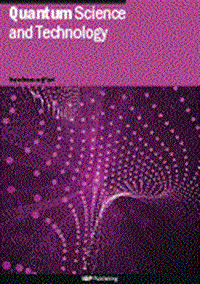面向大尺度量子系统设计的去极化噪声下保真度精确高效分析模型
IF 5
2区 物理与天体物理
Q1 PHYSICS, MULTIDISCIPLINARY
引用次数: 0
摘要
保真度是评估易出错量子处理器上量子电路性能的最有价值和最常用的指标之一。已经提出了几种方法来估计电路保真度,而无需在量子硬件上执行,但它们通常面临可扩展性或准确性的限制。在这项工作中,我们提出了一个全面的理论框架来预测去极化噪声下量子电路的保真度。在理论结果的基础上,提出了一种高效的基于设备校准数据的保真度估计算法。该方法通过在真实硬件上的模拟和执行进行了彻底的验证,与最先进的替代方法相比,显示出更高的准确性,预测R2的增强范围从4.96%到213.54%。所提出的方法为量子硬件的基准测试、比较量子软件技术(如编译方法)、获得量子系统的计算边界以及指导硬件设计决策提供了可扩展和实用的工具,使其成为开发和评估量子计算技术的关键资源。本文章由计算机程序翻译,如有差异,请以英文原文为准。
An accurate and efficient analytic model of fidelity under depolarizing noise oriented to large scale quantum system design
Fidelity is one of the most valuable and commonly used metrics for assessing the performance of quantum circuits on error-prone quantum processors. Several approaches have been proposed to estimate circuit fidelity without executing it on quantum hardware, but they often face limitations in scalability or accuracy. In this work, we present a comprehensive theoretical framework to predict the fidelity of quantum circuits under depolarizing noise. Building on theoretical results, we propose an efficient fidelity estimation algorithm based on device calibration data. The method is thoroughly validated through simulation and execution on real hardware, demonstrating improved accuracy compared to state-of-the-art alternatives, with enhancements in prediction R2 ranging from 4.96% to 213.54%. The proposed approach provides a scalable and practical tool for benchmarking quantum hardware, comparing quantum software techniques such as compilation methods, obtaining computation bounds for quantum systems, and guiding hardware design decisions, making it a critical resource for developing and evaluating quantum computing technologies.
求助全文
通过发布文献求助,成功后即可免费获取论文全文。
去求助
来源期刊

Quantum Science and Technology
Materials Science-Materials Science (miscellaneous)
CiteScore
11.20
自引率
3.00%
发文量
133
期刊介绍:
Driven by advances in technology and experimental capability, the last decade has seen the emergence of quantum technology: a new praxis for controlling the quantum world. It is now possible to engineer complex, multi-component systems that merge the once distinct fields of quantum optics and condensed matter physics.
Quantum Science and Technology is a new multidisciplinary, electronic-only journal, devoted to publishing research of the highest quality and impact covering theoretical and experimental advances in the fundamental science and application of all quantum-enabled technologies.
 求助内容:
求助内容: 应助结果提醒方式:
应助结果提醒方式:


